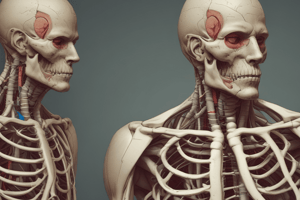Podcast
Questions and Answers
What was the significance of the invention of the printing press around 1440 during the Renaissance?
What was the significance of the invention of the printing press around 1440 during the Renaissance?
- It ensured that ancient texts were preserved indefinitely.
- It eliminated the need for handwritten manuscripts.
- It enabled quick dissemination of new ideas across Europe. (correct)
- It allowed artists to create more detailed artworks.
Which ancient physician's ideas were notably challenged during the Renaissance by Andreas Vesalius?
Which ancient physician's ideas were notably challenged during the Renaissance by Andreas Vesalius?
- Avicenna
- Aristotle
- Galen (correct)
- Hippocrates
What role did artists play in the medical advancements during the Renaissance?
What role did artists play in the medical advancements during the Renaissance?
- They developed new theories about human anatomy.
- They improved the accuracy of human body depictions. (correct)
- They conducted experiments to discover new medicines.
- They wrote medical texts that became the foundation of modern medicine.
What was one of Edward Jenner's notable contributions to medicine during the Renaissance?
What was one of Edward Jenner's notable contributions to medicine during the Renaissance?
How did the Renaissance contribute to the field of medicine?
How did the Renaissance contribute to the field of medicine?
Which of the following best describes the Renaissance period?
Which of the following best describes the Renaissance period?
What was a consequence of the renewed interest in ancient ideas during the Renaissance?
What was a consequence of the renewed interest in ancient ideas during the Renaissance?
What was a primary feature of medical books produced during the Renaissance?
What was a primary feature of medical books produced during the Renaissance?
Flashcards
Renaissance
Renaissance
The period in European history marked by a renewed interest in classical art, literature, and thought, which led to significant advancements in various fields, including medicine.
Renaissance (meaning)
Renaissance (meaning)
A French word meaning 'rebirth', symbolizing the revival of classical learning and art during the Renaissance.
Anatomy
Anatomy
The study of the human body, particularly anatomy.
Galen
Galen
Signup and view all the flashcards
Andreas Vesalius
Andreas Vesalius
Signup and view all the flashcards
Printing Press (Johannes Gutenberg)
Printing Press (Johannes Gutenberg)
Signup and view all the flashcards
Vaccination (Edward Jenner)
Vaccination (Edward Jenner)
Signup and view all the flashcards
Scientific Discoveries
Scientific Discoveries
Signup and view all the flashcards
Study Notes
Renaissance Medical Discoveries
-
Renaissance, meaning "rebirth," saw a revival of European art and literature, influenced by classical Roman and Greek works.
-
Medical breakthroughs challenged ancient ideas, particularly those of Galen.
-
Andreas Vesalius's studies disproved some of Galen's theories, leading to further questioning.
-
Edward Jenner developed the first vaccine.
-
Despite challenges to ancient beliefs, some traditional notions of disease causes and treatment persisted.
-
The invention of the printing press in 1440 (Johannes Gutenberg) allowed for faster dissemination of new ideas across Europe.
-
Renaissance artists improved the accuracy of anatomical drawings, aiding medical book depictions.
-
Advances in Renaissance medicine involved revisiting and challenging ancient medical ideas, leading to scientific, technological, artistic, exploratory, and medical progress.
Studying That Suits You
Use AI to generate personalized quizzes and flashcards to suit your learning preferences.




